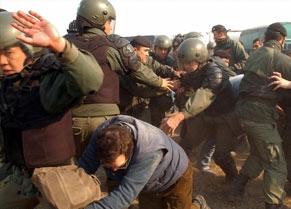 The protest threatened to disrupt the loading of cargo ships waiting along the Parana and La Plata rivers for corn needed to replenish global reserves left thin by last year's poor U.S. harvest. Truck flow into Argentina's main grain port of Rosario was slower than usual, due to lack of selling by farmers.
The protest threatened to disrupt the loading of cargo ships waiting along the Parana and La Plata rivers for corn needed to replenish global reserves left thin by last year's poor U.S. harvest. Truck flow into Argentina's main grain port of Rosario was slower than usual, due to lack of selling by farmers.The strike will continue until Wednesday night at midnight, Julio Curras, vice president of the Argentine Agrarian Federation, said on Saturday, when the protest officially started.
With grain markets closed on weekends, Monday was the first day exporters would feel the strike's effects. Local markets will also close on Thursday and Friday for official holidays.
Global importers' reliance on South American corn and soybeans has increased in 2013 because U.S. stocks of both commodities are the tightest in years. Late planting in the United States and a harvest likely to be later than normal have increased demand for Argentine and Brazilian crops.
But even in Argentina, port-side corn stocks are lacking after farmers interrupted that harvest to bring in soy, which is Argentina's main agricultural export. Before the protest was called, growers had planned to harvest and sell a good amount of corn this week.
So far, farmers have brought in 80 percent of their 2012/13 corn and 99 percent of their soybeans.
The agriculture ministry expects the country to harvest 25.7 million tonnes corn and 50.6 million of soybeans this season.
Argentina's main farm groups called the strike. The sector has long been at odds with President Cristina Fernandez, who was re-elected in 2011 on promises of increasing the state's role in the economy.
Her government puts a 35 percent tax on soybean exports and curbs overseas shipments of corn and wheat to ensure ample domestic food supplies. Growers say the curbs reduce profits by cutting competition among the exporters who bid for their crops.





